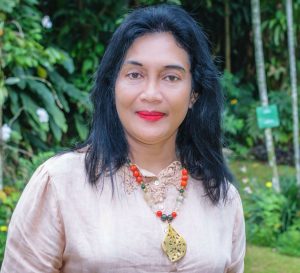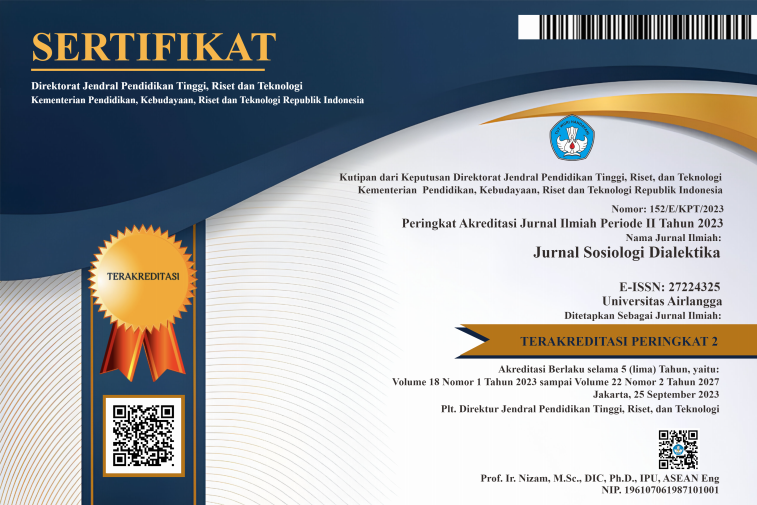Sexual violence among female commuter line passengers in Jakarta
Downloads
This topic of this research is sexual violence that occurred on commuter line electric trains in the Jabodetabek area. This study aims to investigates the experiences of women victims of sexual violence on commuter line trains. Taking a social setting in the Jabodetabek area, namely the Jakarta-Tangerang City, Jakarta-Rangkasbitung Banten, Jakarta-Bekasi West Java and Jakarta-Bogor West Java routes, the researcher also explored the factors of victims not reporting the violence experienced and the conditions after experiencing violence. This study uses a case study method, with 149 commuter line KRL passengers as research subjects. The findings show that 24 passengers on the Jakarta-Tangerang City route, 1 in 6 passengers experienced sexual harassment and occurred in 2018, and 2023. Data from 41 female users of the KRL computer line on the Jakarta-Rangkasbitung Banten route, 1 in 4 women have experienced sexual harassment. Meanwhile, data from 38 female passengers who were interviewed on the Jakarta-Bekasi route in West Java showed that 1 in 5 passengers experienced sexual harassment while they were using the KRL commuter line. Data from 46 female passengers interviewed showed that 1 in 4 women had experienced sexual harassment on the Jakarta-Bogor West Java KRL route. The conclusion of this study shows that the process of silencing victims of sexual violence because the stigma of the victim is negative, the victim is placed in the position of the guilty party, unable to protect themselves, obliged to accept this behaviour, and must be silent to accept their weak nature.
Aminullah M (2020) Komunikasi dalam pemikiran Richard West dan Lynn H Turner untuk menjadikan komunikasi yang beretika. At-Tabayyuun: Journal Islamic Studies 1 (1):1-17. https://journal.iainlhokseumawe.ac.id/index.php/attabayyun/article/view/1729.
Are C (2023) An autoethnography of automated powerlessness: Lacking platform affordances in Instagram and TikTok account deletions. Media, Culture and Society 45 (4):822-840. https://doi.org/10.1177/01634437221140531.
Ariana R (2022) Refusing color-blind myths in black feminist otherwise spaces. Gender & Society 36 (2):239-263. https://doi.org/10.1177/08912432221075098.
Aris S & Rudiatin E (2023) Respon perempuan terhadap kekerasan seksual (Studi kasus di kereta rel listrik Jabodetabek). KHIDMAT SOSIAL: Journal of Social Work and Social Services 3 (2):120-129. https://jurnal.umj.ac.id/index.php/khidmatsosial/article/view/17775.
Azizah N (2021) Aliran feminis dan teori kesetaraan gender dalam hukum. SPECTRUM: Journal of Gender and Children Studies 1 (1):1-10. https://doi.org/10.30984/spectrum.v1i1.163.
Baranowska-Rataj A & Matysiak A (2022) Family size and men’s labor market outcomes: Do social beliefs about men’s roles in the family matter? Feminist Economics 28 (2):93-118. https://doi.org/10.1080/13545701.2021.2015076.
Bendar A (2020) Feminisme dan gerakan sosial. Al-Wardah 13 (1):18-25.
Espinosa J, Dejene T, Guijarro M, Cerdá X, Madrigal J, & Martín-Pinto P (2023) Fungal diversity and community composition responses to the reintroduction of fire in a non-managed mediterranean shrubland ecosystem. Forest Ecosystems 01 (10):1-12. https://doi.org/10.1016/j.fecs.2023.100110.
Friedmann E & Efrat-Treister D (2023) Gender bias in STEM hiring: Implicit in-group gender favoritism among men managers. Gender & Society 37 (1):32-64. https://doi.org/10.1177/08912432221137910.
Gao H, Jia H, & Guo B (2023) Resources available for me versus us: Implications for mitigating consumer food waste. Journal of Marketing Research 61 (4):619-637. https://doi.org/10.1177/00222437231162615.
González I, Seo B, & Floro MS (2022) A Theoretical Framework - Gender Wage Gap Gender Norms and Long-Term Care A Theoretical Framework. Feminis Economic 28 (3):84-113. https://doi.org/10.1080/13545701.2022.2081353.
Halpin M (2022) How incels discredit themselves to degrade women. Gender & Society 36 (6):813-837. https://doi.org/10.1177/08912432221128545.
Heiselberg MH & Raun T (2024) Educate yourself! Exploring feminist politics and self-development in Danish online fat activism. Feminist Media Studies 0 (0):1-16 https://doi.org/10.1080/14680777.2024.2363852.
Hossein CS (2021) Racialized people, Women and social Enterprises Politicized Economic Solidarity in Toronto Enhanced Reader. Feminis Economic 27 (3):21-50. https://doi.org/10.1080/13545701.2020.1821078.
Ilaa DT (2021) Feminisme dan kebebasan perempuan Indonesia dalam filosofi. Jurnal Filsafat Indonesia 4 (3):211-216. https://doi.org/10.23887/jfi.v4i3.31115.
Inayatillah I, Nor MRM, & Faisal M (2022) Social history of Islamic Law from gender perspective in Aceh: A study of marriage traditions in South Aceh, Indonesia. Samarah 6 (2):573-593. https://doi.org/10.22373/sjhk.v6i2.14598.
Jayanti RA, Joewono TB, & Rizki M (2021) Aksebilitias statiusn kereta rel listrik commuterline berdasarkan persepsi wanita. Jurnal Transportasi 21 (1):63-73. https://doi.org/10.26593/jtrans.v21i1.4904.63-72.
Jule A (2018) All together now choral respons, gender and linguistic space in a cameroonian primery classroom. African Journal of Teacher Education 7 (1). https://doi.org/10.21083/ajote.v7i1.3765.
Kabeer N (2020) Women’s empowerment and economic development: A feminist critique of storytelling practices in “randomista” economics. Feminist Economics 26 (2):1-26. http://dx.doi.org/10.1080/13545701.2020.1743338.
Karliana A & Prabowo H (2014) Pelecehan seksual di angkutan KRL ekonomi dari perspektif pelaku. In: The 17th FSTPT International Symposium, August. 22-24.
KPAI (2019) Laporan idependen Lembaga Nasional Hak Asasi Manusia Komisi Nasional Anti kekerasan terhadap Perempuan. 1-177.
Kusmarni Y (1989) Studi kasus. UGM Jurnal Edu UGM Press. 1-12.
Kustiawan MT, Rasidin M, Witro D, Busni D, & Jalaluddin ML (2023) Islamic leadership contestation: Exploring the practices of conservative Islamic movements in Indonesia. Jurnal Ilmiah Islam Futura 23 (2):196-217. https://doi.org/10.22373/JIIF.V23I2.14938.
Lenze J & Klasen S (2017) Does women’s labor force participation reduce domestic violence? Evidence from Jordan. Feminist Economics 23 (1):1-29 https://doi.org/10.1080/13545701.2016.1211305.
Mabruri E, Syahlan ZA, Sahlan MS, Anwar TB, & Romijarso BA (2016) Effect of tempering temperature on hardness and impact resistance of the 410- 1Mo martensitic stainless steels for steam turbine blades. International Journal of Engineering and Technology 8 (6):1-8. https://doi.org/10.21817/ijet/2016/v8i6/160806208.
Monalisa C, Tangkudung M, Rompis SYR, & Timboeleng JA (2019) Pengaruh gender terhadap pemilihan moda transportasi di Kota Manado. Jurnal Sipil Statik 7 (7):827-834.
Mowri S & Bailey A (2023) Framing safety of women in public transport: A media discourse analysis of sexual harassment cases in Bangladesh. Media, Culture and Society 45 (2):266-284. https://doi.org/10.1177/01634437221111913.
Najib, Angkat HR, & Zhuhri MI (2024) Persepsi perempuan MRT terhadap kebutuhan kereta khusus perempuan. JMTS: Jurnal Mitra Teknik Sipil 7 (3):1049-1054.
Oktavilantika DM, Suzana D, & Damhuri TA (2023) Literature review: Promosi kesehatan dan model teori perubahan perilaku kesehatan. Jurnal Pendidikan Tambusai 7 (1):1480-1494.
Onaran Ö, Oyvat C, & Fotopoulou E (2022) Gendering macroeconomic analysis and development policy: A theoretical model. Feminist Economics 28 (3):23-55. https://doi.org/10.1080/13545701.2022.2033294
Rahayu SD & Legowo M (2022) Perlawanan perempuan menghadapi pelecehan verbal. Jurnal Analisa Sosiologi 11 (3):464-480.
Ridlo U (2023) Metode Penelitian Studi Kasus: Teori dan Praktik. Jakarta: Publica Indonesia Utama. 86-87.
Rukman R & Huriani Y (2023) Stigma terhadap perempuan korban kekerasan seksual. Jurnal Iman dan Spiritualitas 3 (3):447-454. https://doi.org/10.15575/jis.v3i3.29853.
Saikuddin A & Amrullah AK (2023) The dynamic of gender equality and new directions for the role of sudi women. Center of Midlle Eastern Studies 16 (1):51-59. https://doi.org/10.20961/cmes.16.1.64149.
Sakinah NR (2024) Analisis efektivitas pelayanan pada kereta khusus wanita KRL Commuter Line Jakarta. Journal of Politic and Government Studies 13 (4):260-270. https://ejournal3.undip.ac.id/index.php/jpgs/article/view/47293.
Saliman J & Putranto LS (2020) Kajian manfaat gerbong khusus wanita di KRL commuter line Jabodetabek. JMTS: Jurnal Mitra Teknik Sipil 3 (4):989-1002. https://doi.org/10.24912/jmts.v3i4.8398.
Syawal MS, Dwiandini A, Khaerunnisa DH, & Irwansyah I (2024) Exploring the role of muted group theory in understanding women’s experiences: A systematic literature review. International Journal of Humanity Studies (IJHS) 7 (2):279-294.
Sari WP (2016) Woman as muted group (Case study of woman in Sasak Ethnic Group). International Conference on Transformation in Communication (ICOTIC). https://openlibrarypublications.telkomuniversity.ac.id/index.php/icotic/article/view/5674.
Sbaihat A (2022) Khadijah’s image in 19th century orientalism. Al-Jami’ah 60 (2):399-426. https://doi.org/10.14421/ajis.2022.602.399-426.
Sent EM & van Staveren I (2019) A feminist review of behavioral economic research on gender differences. Feminist Economics 25 (2):1-35. https://doi.org/10.1080/13545701.2018.1532595
Sesan T, Clifford M, Jewitt S, & Ray C (2019) “We learnt that being together would give us a voice”: Gender perspectives on the East African improved-cookstove value chain. Feminist Economics 25 (4):240-266. https://doi.org/10.1080/13545701.2019.1657924.
Setiadi MP, Rasji R, & Limanto MF (2023) Penanganan pelecehan seksual di KRL oleh penumpang KRL berdasarkan UU no.12 2022. Jurnal Ilmiah Wahana Pendidikan 2 (19):349-365. https://doi.org/10.5281/zenodo.8415820.
Shalahudin NL & Hariyanto D (2023) Strategi humas PT KAI dalam memutus mata rantai kekerasan seksual di atas kereta api. Al Qalam: Jurnal Ilmiah Keagamaan dan Kemasyarakatan 17 (3):1916-1926. https://doi.org/10.35931/aq.v17i3.2158.
Sjolie HK, Akin D, & Lauritzen T (2024) Gender differences in job experiences and satisfaction in the forest sector. Canadian Journal of Forest Research 1 (54):224-237. https://doi.org/10.1139/cjfr2023-0036.
Soe’oed DV & Toni A (2020) Jingle dunia fantasi dalam realita analisis wacana. Jurnal Pewarta Indonesia 2 (2):113-120. https://doi.org/10.25008/jpi.v2i2.35.
Sriatmi A & Patriajati S (2024) The correlation between behavioral and psychological factors with booster immunization adherence for children aged <24 months. Jurnal Promosi Kesehatan Indonesia 19 (2):120-128. https://doi.org/10.14710/jpki.19.2.120-128.
Szymborska HK (2022) The evolution of gender wealth inequality in the United States in a Changing Institutional Context. Feminist Economics 28 (2):32-63. https://doi.org/10.1080/13545701.2022.2042583.
Vasudevan R & Raghavendra S (2022) Women’s self-employment as a developmental strategy: The dual constraints of care work and aggregate demand. Feminist Economics 28 (3):56-83. https://doi.org/10.1080/13545701.2022.2044497.
Wall CJ & Gannon-Leary P (1999) A sentence made by men: Muted group theory revisited. European Journal of Women’s Studies 6 (1):21-29. https://doi.org/10.1177/135050689900600103.
Wewengkang FB & Sumarwan U (2020) Stigma laki-laki sebagai pelaku pelecehan seksual KRL commuter line daerah Jabodetabek. Anomie 2 (3):181-196. https://jom.fisip.budiluhur.ac.id/index.php/anomie/article/view/499.
Wong JS & Daminger A (2024) The myth of mutuality: Decision-making, marital power, and the persistence of gender inequality. Gender & Society 38 (2):157-186. https://doi.org/10.1177/08912432241230555.
Yazan B (2015) Three approaches to case study methods in education: Yin, Merriam, and Stake. The Qualitative Report 20 (2):134-152. https://doi.org/10.46743/2160-3715/2015.2102.

This work is licensed under a Creative Commons Attribution-NonCommercial-ShareAlike 4.0 International License.
1. Copyright of this journal is possession of Editorial Board and Journal Manager, by the knowledge of author, whilst the moral right of the publication belongs to the author.
2. Legal formal aspect of journal publication accessibility refers to Creative Commons Attribution-NonCommercial-ShareAlike (CC BY-NC-SA), implies that publication can be used for non-commercial purposes in its original form (cannot be modified).
3. Every publications (printed/electronic) are open access for educational purposes, research, and library. Other that the aims mentioned above, editorial board is not responsible for copyright violation.















